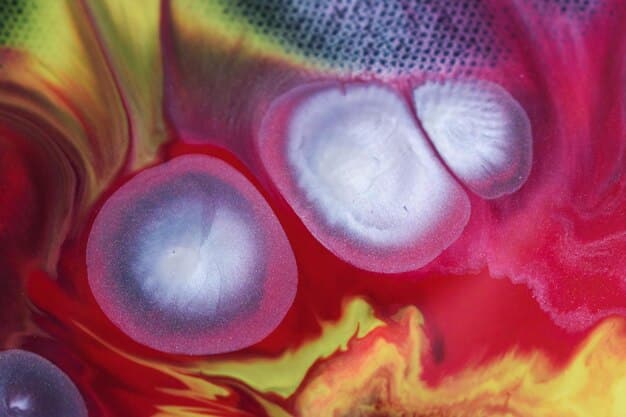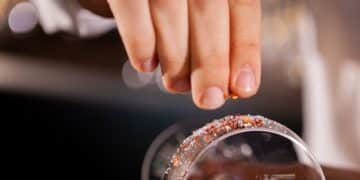Boost Sperm & Fertility Naturally: 2025 Strategies

Increasing sperm count and improving fertility naturally involves a multi-faceted approach focusing on targeted dietary changes, lifestyle modifications, strategic supplementation, stress reduction, and avoiding harmful environmental exposures, all grounded in the latest scientific insights for sustainable results by 2025.
For many couples, the journey to parenthood can be filled with both hope and challenges. Understanding How to Increase Sperm Count and Improve Fertility Naturally: Proven Strategies for 2025 is becoming increasingly vital as male factor infertility continues to be a significant concern globally. This comprehensive guide delves into evidence-based approaches, offering practical, actionable advice to enhance male reproductive health.
Understanding Male Fertility: Beyond the Numbers
The landscape of male fertility is more complex than simply counting sperm. While sperm count is a crucial metric, factors such as sperm motility (ability to move), morphology (shape), and DNA integrity play equally significant roles in successful conception. Declines in average sperm counts have been reported globally over recent decades, prompting a deeper investigation into lifestyle, dietary, and environmental influences. This section explores the foundational understanding necessary before embarking on strategies to improve male reproductive health.
The Interconnected Factors
Male fertility is an intricate balance influenced by a myriad of internal and external factors. Hormonal balance, genetic predisposition, and the overall health of the reproductive system are paramount. However, external elements like diet, exercise, stress levels, and exposure to certain environmental toxins can significantly impact sperm production and quality. Recognizing these interconnections is the first step toward effective intervention.
- Hormonal Harmony: Testosterone, FSH, and LH levels are critical for spermatogenesis. Imbalances can severely impair sperm production.
- Structural Integrity: The health of the testes, epididymis, and vas deferens is essential for sperm maturation and transport.
- Genetic Blueprint: Chromosomal abnormalities or gene mutations can affect sperm quality and quantity.
Beyond the biological aspects, psychological well-being also plays a part. Chronic stress, for instance, can elevate cortisol levels, which in turn can negatively affect hormone production vital for fertility. Therefore, a holistic approach that considers both physical and mental health is often the most effective. This initial understanding creates a robust framework upon which comprehensive fertility improvement strategies can be built for 2025 and beyond. Each component, from cellular health to psychological state, contributes to the overall reproductive capacity of a man.
Dietary Powerhouses: Fueling Fertility
Diet is a cornerstone of overall health, and its impact on male fertility cannot be overstated. What a man consumes directly influences the quality, quantity, and motility of his sperm. Adopting a nutrient-rich diet can provide the essential building blocks and antioxidants necessary to protect sperm from damage and optimize their function. This section outlines key dietary strategies proven to support and enhance male reproductive health, emphasizing foods that are rich in fertility-boosting compounds.
Embracing Nutrient-Dense Foods
A diet centered on whole, unprocessed foods is fundamental. Focus on an abundance of fruits, vegetables, whole grains, lean proteins, and healthy fats. These food groups collectively supply a spectrum of vitamins, minerals, and antioxidants critical for spermatogenesis and sperm health. Minimizing processed foods, sugary drinks, and excessive saturated fats is equally important, as these can contribute to inflammation and oxidative stress, both detrimental to sperm quality.
- Antioxidant-Rich Produce: Berries, leafy greens, colorful vegetables provide vitamins C and E, selenium, and zinc, protecting sperm from oxidative damage.
- Omega-3 Fatty Acids: Found in fatty fish like salmon, flaxseeds, and walnuts, omega-3s are vital for sperm membrane health and motility.
- Folate (Vitamin B9): Legumes, leafy greens, and fortified cereals offer folate, crucial for DNA synthesis and sperm production.
Incorporating foods high in specific minerals like zinc and selenium is particularly impactful. Zinc, abundant in oysters, red meat, and pumpkin seeds, plays a vital role in testosterone metabolism and sperm formation. Selenium, found in Brazil nuts, fish, and whole grains, acts as a powerful antioxidant within the testes. Furthermore, adopting a Mediterranean-style diet, rich in olive oil, nuts, seeds, and fresh produce, has been consistently linked to improved sperm parameters. The synergy of these whole foods creates an optimal internal environment, directly supporting the body’s natural ability to produce healthy, viable sperm, setting the stage for improved fertility in 2025.
Strategic Supplementation: Bridging Nutritional Gaps
While a balanced diet is paramount, certain nutritional gaps can sometimes be challenging to fill through food alone. Strategic supplementation can provide targeted support for male reproductive health, offering specific nutrients and compounds known to enhance sperm parameters. However, it’s crucial to approach supplementation judiciously, ideally under the guidance of a healthcare professional, to ensure safety and efficacy. This section explores key supplements that have demonstrated potential benefits for increasing sperm count and improving fertility.
Key Fertility-Enhancing Supplements
Several supplements have garnered attention for their positive effects on male fertility. These often include antioxidants, specific vitamins, and amino acids that play critical roles in sperm production, maturation, and protection. Coenzyme Q10 (CoQ10), for example, is a powerful antioxidant and energy producer found in sperm that can improve motility and morphology. L-carnitine assists in sperm maturation and energy metabolism, while vitamin D deficiency has been linked to impaired testosterone levels and sperm quality.
- Coenzyme Q10 (CoQ10): Potent antioxidant, improves sperm motility and morphology. Recommended dosage often ranges from 200-400 mg daily.
- L-Carnitine: Essential for sperm energy metabolism and maturation. Dosages typically between 1-3 grams daily.
- Vitamin D: Linked to testosterone levels and sperm quality. Supplementation should be based on blood levels.
- Zinc: Crucial for testosterone production and sperm development. Common dosages range from 15-30 mg daily.
- Folic Acid and B12: Important for DNA synthesis and reducing chromosomal abnormalities in sperm.
Beyond these, antioxidants like Vitamin C and E, and minerals such as selenium, can also be beneficial in reducing oxidative stress, a major contributor to sperm damage. Furthermore, omega-3 fatty acids, often supplemented through fish oil, can enhance sperm membrane fluidity and function. While these supplements show promise, individual responses can vary. The effectiveness hinges on addressing underlying deficiencies and integrating supplementation as part of an overall healthy lifestyle, rather than a standalone solution. Always consult with a healthcare provider to determine appropriate dosages and rule out any potential interactions with existing medications, making informed choices for improved fertility in 2025.

Lifestyle Modifications: A Holistic Approach
Beyond diet and supplements, daily lifestyle choices exert a profound influence on male reproductive health. Adopting healthier habits can significantly impact sperm quality and count, addressing factors that may otherwise impede fertility. This holistic approach encompasses stress reduction, regular physical activity, maintaining a healthy weight, and making conscious decisions about substance use. Implementing these changes offers a powerful, natural pathway to enhancing fertility, complementing dietary and supplemental strategies.
Cultivating Healthy Habits
Stress, in particular, is a pervasive modern challenge with direct implications for male fertility. Chronic stress can disrupt hormonal balance, leading to decreased sperm production. Engaging in stress-reducing activities such as meditation, yoga, mindfulness, or simply spending time in nature can mitigate these negative effects. Regular exercise is another vital component, improving circulation, reducing inflammation, and supporting overall hormonal health. However, moderation is key; excessive or extreme exercise can sometimes have counterproductive effects.
- Stress Management: Practice daily meditation, deep breathing exercises, or engage in hobbies to lower cortisol levels.
- Moderate Exercise: Aim for 30-60 minutes of moderate physical activity most days of the week, avoiding overtraining.
- Weight Management: Maintain a healthy BMI, as obesity can negatively impact hormone levels and sperm quality.
Furthermore, avoiding harmful substances is critical. Smoking dramatically reduces sperm count, motility, and increases DNA damage. Excessive alcohol consumption can impair testosterone production and sperm quality. Recreational drug use also carries significant risks. Limiting exposure to environmental toxins, such as pesticides, phthalates, and bisphenol A (BPA) found in plastics, is also advised, as these endocrine disruptors can interfere with reproductive hormones. Simple changes, like using glass containers and choosing organic produce, can contribute to a healthier reproductive environment. By embracing these lifestyle modifications, men actively empower their bodies to optimize sperm production and improve their chances of conception naturally, a key focus for fertility in 2025.
Environmental Factors and Fertility: A Modern Challenge
In our increasingly industrialized world, environmental factors have emerged as significant contributors to male infertility. Exposure to certain toxins and chemicals, often overlooked in daily life, can disrupt hormonal balance, damage sperm DNA, and impair overall reproductive function. Understanding these hidden threats is crucial for men striving to improve their fertility naturally. This section delves into common environmental stressors and offers practical strategies for minimizing exposure, aligning with a proactive approach to reproductive health in 2025.
Navigating a Toxic Landscape
Many everyday products and pervasive pollutants contain endocrine-disrupting chemicals (EDCs). These substances mimic or block natural hormones, interfering with the delicate hormonal cascades essential for sperm production. Phthalates, found in plastics and personal care products, and Bisphenol A (BPA), common in food packaging and thermal paper, are prime examples. Pesticides and herbicides used in agriculture also pose a threat, as they can enter the food chain and accumulate in the body. The cumulative effect of these exposures can be subtle but damaging over time.
- Endocrine Disruptors: Avoid plastics with recycling codes 3, 6, and 7, and opt for glass or stainless steel food containers.
- Pesticides & Herbicides: Choose organic produce when possible, especially for foods with high pesticide residues.
- Heavy Metals: Be mindful of sources like contaminated water, old paint, and certain types of seafood (mercury).
Beyond chemical exposure, factors like excessive heat can also impact sperm production. The testes are designed to operate at a slightly lower temperature than the rest of the body for optimal spermatogenesis. Prolonged exposure to high temperatures, whether from hot tubs, saunas, restrictive clothing, or even excessive laptop use on the lap, can impair sperm quality. Addressing these environmental considerations requires conscious choices and a willingness to adapt daily routines. By prioritizing a cleaner, less toxic living environment, men can significantly reduce impediments to their reproductive health, fostering a more favorable internal landscape for sperm production and overall fertility as we move into 2025. This awareness empowers individuals to take proactive steps, securing their reproductive well-being against modern environmental challenges.

When to Seek Professional Guidance
While natural strategies offer significant benefits for improving sperm count and fertility, there are instances when professional medical guidance becomes essential. Recognizing the signs and knowing when to consult a fertility specialist can save valuable time and provide access to advanced diagnostic tools and treatment options. This section outlines key scenarios where professional intervention is recommended, emphasizing that a collaborative approach between natural methods and medical expertise often yields the best outcomes for aspiring parents.
Identifying the Need for Expert Consultation
If a couple has been trying to conceive for a year (or six months if the female partner is over 35) without success, it’s advisable to seek professional evaluation. Persistent low sperm counts or abnormal sperm parameters identified through semen analysis warrant a medical opinion. Additionally, if there are known medical conditions that could impact fertility, such as a history of testicular injury, infections, hormonal imbalances, or genetic predispositions, proactive consultation is crucial. These situations often require more than lifestyle adjustments alone.
- Unexplained Infertility: After 12 months of unprotected intercourse (or 6 months if female partner is over 35) without conception.
- Abnormal Semen Analysis: If initial tests show low sperm count, poor motility, or abnormal morphology.
- Known Medical Conditions: History of varicocele, hormonal imbalances, chronic illnesses, or prior urological surgeries.
- Recurrent Miscarriages: Male factor DNA fragmentation can contribute to this issue.
A fertility specialist can perform a comprehensive evaluation, including detailed semen analysis, hormonal assessments, genetic testing, and physical examinations to identify underlying causes of infertility. They can also recommend targeted treatments, which may include medication, surgical correction (for conditions like varicocele), or assisted reproductive technologies (ART) such as IVF or ICSI. While natural methods lay a strong foundation for optimal reproductive health, professional guidance provides a safety net and access to interventions necessary for complex cases. Integrating natural strategies with timely medical advice ensures a holistic and effective approach to the journey of conception, offering the best possible chances for success in 2025 and beyond. This balanced perspective underscores the importance of both self-care and expert support.
| Key Point | Brief Description |
|---|---|
| 🍎 Nutrient-Rich Diet | Consume antioxidants, omega-3s, zinc, and selenium through whole foods to support sperm health. |
| 💊 Targeted Supplements | Consider CoQ10, L-Carnitine, and Vitamin D to bridge nutritional gaps, under professional guidance. |
| 🧘♂️ Healthy Lifestyle | Manage stress, exercise moderately, maintain healthy weight, and avoid harmful substances or heat. |
| 🚫 Environmental Awareness | Minimize exposure to endocrine disruptors and chemicals found in plastics and pesticides. |
Frequently Asked Questions About Male Fertility
Because sperm production (spermatogenesis) takes about 72-74 days, it typically takes at least three months of consistent lifestyle changes and supplementation to observe noticeable improvements in sperm count and quality through semen analysis. Patience and sustained effort are key to seeing positive outcomes from natural strategies implemented for male fertility.
Yes, it’s advisable to limit processed foods, excessive red meat, high-sugar beverages, and unhealthy trans fats. These can promote inflammation and oxidative stress, both detrimental to sperm quality. Opting for organic produce can also reduce exposure to pesticides that may negatively impact reproductive health. Moderation is important for overall dietary choices.
Absolutely. Chronic stress can significantly impact male fertility by altering hormone levels, particularly increasing cortisol, which can disrupt testosterone production. Elevated stress can also lead to oxidative stress, damaging sperm. Implementing stress-reducing techniques like meditation, mindfulness, or regular light exercise is crucial for creating a more favorable reproductive environment.
Natural fertility methods are highly effective for many cases where lifestyle and nutritional factors contribute to low sperm count or poor quality. However, they may not resolve issues stemming from severe genetic conditions, anatomical blockages, or significant hormonal imbalances that require medical intervention. It’s always best to combine natural approaches with professional medical evaluation for comprehensive care.
Moderate, regular exercise can significantly improve sperm count and quality by reducing oxidative stress, enhancing hormone balance, and improving overall circulation. However, excessive or intense exercise, especially high-impact activities or those causing testicular overheating, can sometimes have a negative impact. Balance is key; aiming for consistent moderate activity is recommended for optimal fertility benefits.
Conclusion
The journey to enhance male fertility naturally is a proactive and empowering one, deeply rooted in lifestyle choices, dietary awareness, and environmental consciousness. By embracing the strategies outlined—from nutrient-rich diets and strategic supplementation to stress reduction and minimizing toxin exposure—men can significantly optimize their reproductive health. While these natural methods offer immense potential, understanding when to seek professional guidance is equally important for a holistic approach to conception in 2025.





